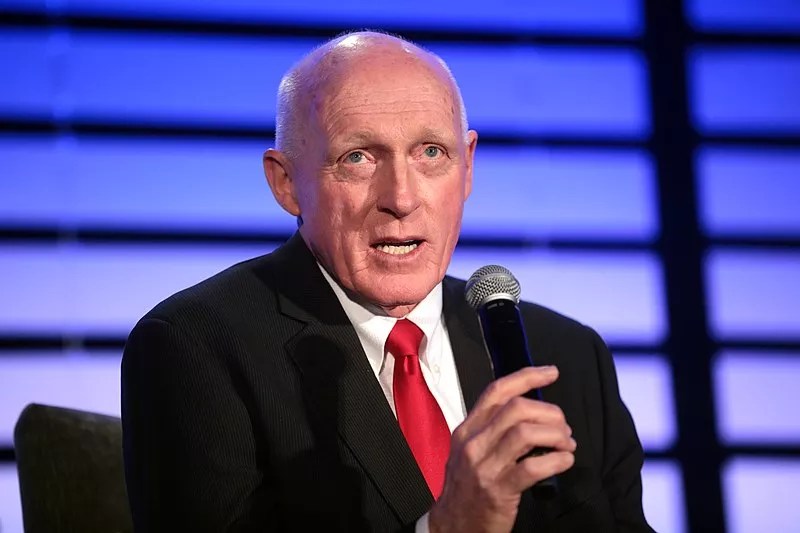
Gage Skidmore via CC 2.0

Audio By Carbonatix
For the past week, a ballot referral that would limit Arizona’s marijuana products to 2 percent THC has been troubling cannabis advocates who argue it would hurt patients and upend the state’s entire medical marijuana program.
Under pressure on Thursday, Republican House Speaker Rusty Bowers, who introduced the bill, agreed to slash the potency limit with a floor amendment. But his anti-marijuana measure is still advancing in the State Legislature with other provisions that advocates say are dangerous.
If it passes through the full bodies of the House and the Senate, the measure could appear on voters’ ballots in November.
Bowers said he got the idea for House Concurrent Resolution 2045 after reading the controversial book Tell Your Children: The Truth About Marijuana, Mental Illness and Violence, by former New York Times reporter Alex Berenson.
“This has been a rather interesting learning experience for me,” Bowers told the House Health and Human Services Committee on February 20. He cited the book’s claims that high levels of THC in cannabis products are related to spiking crime and violence. “Not everybody’s going to become paranoid schizophrenic and act out violently, but a lot of people are.”
In fact, Berenson’s book has been widely condemned by scientists who say it implies that correlation means causation and hand-selects data to fit a certain narrative. Last February, a group of 100 doctors and academics signed an open letter chiding the book for having a “deeply inaccurate misreading of science.”
That didn’t stop Bowers from introducing a bill that would not only limit the THC of marijuana to 2 percent (far lower than most products on dispensary shelves today), but would also require the state health department to add warning labels to marijuana products and start conducting research on the alleged links between marijuana, schizophrenia, and violence.
The 2 percent cap drew quick and heated opposition from cannabis activists, including Dr. William Troutt, who introduced himself at the committee as a naturopathic doctor.
“This bill would essentially end the medical marijuana program in Arizona as we know it,” he said. “The only cannabis varieties below 2 percent THC in the dispensary are CBD varieties.”
Parents of children with medical marijuana cards also offered testimony, saying their kids relied on products that contained higher than 2 percent THC. Brandy Williams, a cannabis advocate whose son has severe autism and suffers seizures, was one of them.
“If I could not get the THC levels that I needed for my son, I would go to the black market,” she said. “There is no doubt about it. I will not take this away from him. I spend over $1,200 a month and I pay taxes on that medicine.”
Sue Sisley, a Scottsdale-based cannabis researcher, said there is some research that shows people with predispositions to schizophrenia could get it earlier if they are cannabis users. But she said psychotic side effects are rare, and “cannabis is no different from any other medicine or prescription” that her patients use.
She also said the federal government regularly issues cannabis flower for research that has 10 to 12 percent THC.
“I understand Bowers’ concerns,” Sisley said. “If somebody is not experienced with cannabis, they hear the scary stories and they want to protect the public. I get that, but I wish that he had a more balanced view of the existing scientific literature.”
The ballot referral passed the health committee on February 20 with a 5-4 vote on party lines. Five Republicans voted to advance the bill while four Democrats voted against it.
But a week later, while the measure was being discussed in caucus, Bowers agreed to get rid of the cap, according to Arizona Dispensaries Association Executive Director Sam Richard. It’s not clear whether other amendments will be added to the item, or whether a different limit will be set.
Richard said the ADA still opposes the other parts of the ballot referral.
“The effect, from our perspective, of adding this question to the ballot would only result in confusion, and that’s something we are focused on avoiding,” he said.
Mikel Weisser, state director of the National Organization for the Reform of Marijuana Laws in Arizona, said he’s also against Bowers’ legislation.
“Rusty Bowers has been a very hardhearted legislator when it comes to caring about the way that marijuana has improved the lives of people,” he said.
A spokesperson for Bowers didn’t respond to multiple requests for comment.
The ballot referral is expected to be heard next in the Legislature’s Committee of the Whole, where it could face additional amendments before advancing to the House floor for a vote.